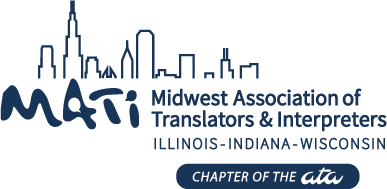MATI-member Margie Franzen, MA, CHI, is a staff interpreter at Dean Health System in Madison, Wisconsin. She recently demonstrated that medical interpreters don’t need to sit on their hands and wait for educational opportunities to come to them. Acting on her own initiative, she organized a workshop for medical interpreters that focused on how best to use the resources available at hospital libraries. In addition to being free of charge, the two-hour session earned holders of the CHI or AHI certification and ATA-certified translators two hours of continuing education. She has set a fine example of resourcefulness and community spirit. Franzen’s description of the workshop follows:
Libraries and language professionals are natural partners. Translators, working with written texts and with scrutinous editing, utilize databases and reference sources frequently. Interpreters, often working with multiple dialects and medical vocabulary, have also turned to libraries at some point to brush up on terminology or to finesse cultural understandings of the languages they work with.
Hospital libraries, however, are often a resource left untapped by medical translators and interpreters. This May, librarians with two large hospitals in Madison, Wisconsin – Meriter Hospital and St. Mary’s Hospital – offered a two-hour workshop on what each library offers to interpreters and translators. It was the first time either Robert Koehler, Chief Medical Librarian for Meriter, and Leslie Christensen, Medical Library Manager for St. Mary’s, had sat down to address how their physical “brick-and-mortar” location and internet resources could meet the needs of language access in the healthcare professions.
Some of the useful talking points were:
1. Hospital libraries are places where freelancers and staff interpreters may access information.
2. PubMed, a research database, is available free of charge and so provides information to all, regardless of staff or freelance status.
3. Other databases, such as OVID (Medline), are only available through a hospital library because it is a hospital must purchase this resource. In this case, all are welcome to use computers, scanners and copiers at the libraries.
4. Much is available online; this in-person workshop gave people more efficient search techniques that will aid their use of online materials.
In the planning leading up to the workshop, both librarians overwhelming wished to put a friendly face to the name of “hospital librarian” so language professionals will be approach them whenever they need information for their work. Indeed, when do we need additional research to bolster our professional contributions in interpretation and translation?
The increasing professionalization of medical interpreters calls for commensurate skills in database use to conduct literature searches and document best-practices. Consider an interpreter services department working with clinical psychotherapists on whether it is appropriate to have the same interpreter for all of a client’s sessions. It behooves the interpreters to access published literature on whether this is indeed the best practice and to know if the medical research differs from other conclusions published in applied linguistics research. Or consider an interpreter recruited to a trainer position whose course compares the pros and cons of video-mediated encounters and face-to-face interpreting. Such a course is enriched not only by the professional experience the trainer will have amassed on the job, but also by knowing how to bolster anecdotal evidence with published research.
This workshop was planned in order to provide two hours of continuing education, both through the ATA (for translators) and through CCHI (for medical interpreters). CCHI especially calls for intermediate or advanced topics in interpreting, and this workshop did address needs that language professionals encounter after having worked professionally in the interpreting field. This workshop was also unique in that it brought together interpreters and translators. Future workshops may make use of what skills translators have that interpreters might learn from – such as these research skills – and which skills translators could pick up from interpreters – such as digesting and holding visual “chunks” of information in their memory to then put words to that image. Comments, ideas or feedback on how this might happen for MATI members in the future may be directed to Margie Franzen at translation@margiefranzen.org
